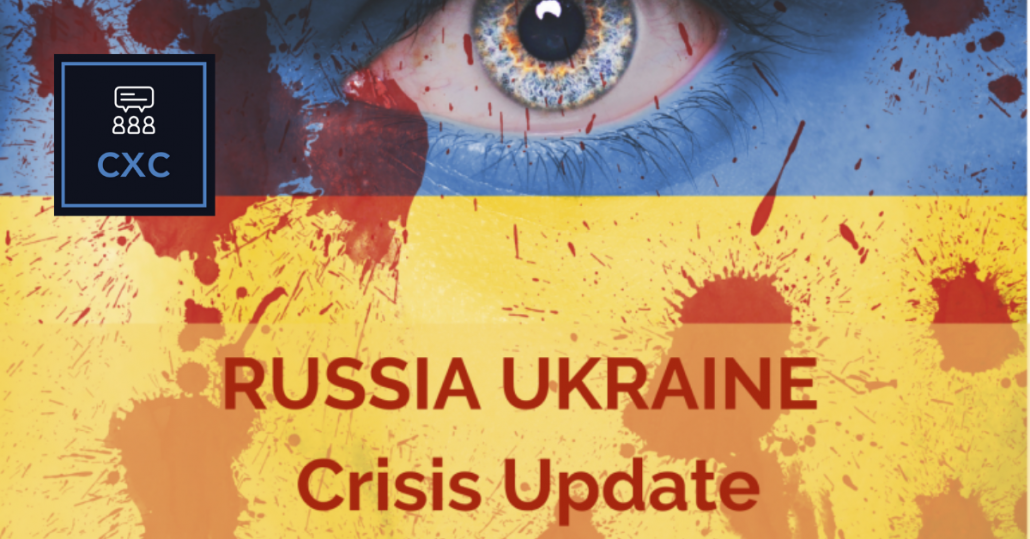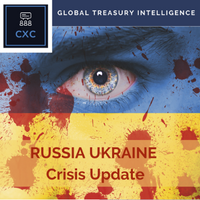Russia Ukraine Crisis Update
16-03-2022 | treasuryXL | ComplexCountries | LinkedIn |
Safety of employees and delivery of salary payments are the highest priorities of treasurers responsible for Russia and Ukraine who also shared their experiences approaches to sanctions compliance, local operations and FX hedging. This report is based on an emergency 90-minute peer call with participation from 15 major companies.
This report was compiled by Monie Lindsey. based on a Treasury Peer Call chaired by Damian Glendinning.

Chair’s Overview
Today’s call was very somber. Two weeks ago (Report: Russia Treasury & Banking Update 21st Feb), members were looking at contingency plans, but the consensus was that most of what was happening was posturing, and that the worst would not happen. Today, there was no discussion of how long hostilities might last – most people agree that there is no easy or rapid solution in sight. Instead, the main priority of most participants is making sure their teams are safe, helping them leave Ukraine if they wish, and making sure salary payments get through in both countries. We all send our best wishes to the many people whose lives have been shattered by this conflict.
The actions and approaches were remarkably consistent across all the participants. Topics discussed and actions taken:
- The main priority is the safety of the local teams. Nearly every participant has taken extra steps to make sure local staff have cash, including prepaying salaries by up to three months. This is being done in both Russia and Ukraine, as MNCs cannot be sure of being able to remit cash to Russia in the future.
- Most participants have either exited, suspended, or slowed down their businesses in Russia. Those who are importing goods into Russia for sale locally are continuing business as long as inventories last, but they are not shipping new inventory into the country.
- There were a few questions about the sanctions, but the general view is that these are clear. Even if a company wants to ship goods into Russia, it is proving very difficult to find logistics companies that are prepared to undertake the shipment.
- Payments continue for the time being. In Ukraine, the banking system continues to function, and some participants have sent cash into the country to make sure salaries are paid. Paying cash out of Ukraine is no longer possible, but payments continue to be made out of Russia, even if they can be slowed down due to additional sanctions checks.
- The main sanctions-related discussion was about the extent to which local payments within Russia can still be made using sanctioned banks. The general feeling was that this is allowed, though there was some confusion. Participants have received conflicting advice about whether there is an effective carve-out in the sanctions for salary payments.
- Foreign banks are registered under local law in Russia, so they can, and do, continue to operate. As usual, some are providing better service than others.
- One issue raised with sanctions is that they can cause issues for the local staff: it may be illegal under local law for them to apply the sanctions, or it can cause them personal issues. This is usually being monitored closely with HR and Legal.
- Most companies are re-evaluating their hedging programs:
- Hedging the rouble has become a lot more expensive, and there is unlikely to be much underlying business to hedge, so most programs will probably stop.
- In many cases, it is proving difficult, or impossible, to roll existing hedges
- For NDFs, the reference rate used for settlement is no longer being quoted *(see note below), so it will be necessary to negotiate with the banks about what alternative rate to use
- No participant was concerned about forwards which require them to deliver roubles outside Russia. However, companies to whom this applies are advised to discuss this situation with their banks: if they find themselves unable to deliver the roubles on the due date, the situation can become messy and potentially expensive.
- Some participants have bolstered local liquidity in Russia by taking out local bank loans, which continue to be available – though there is some nervousness about how long lines may be available. Many have sent in cash via intercompany loans to make sure salaries and taxes can be paid. Several participants have also bolstered the liquidity of their Ukrainian operations by sending in intercompany loans.
- There was little discussion about how to continue making payments despite the sanctions. It was pointed out that, even if a bank is barred from SWIFT, payments can still be made using paper instructions – though delays may occur due to the need to implement new correspondent banking relationships and apply additional sanctioned party checks. In any case, the feeling is that sanctions will limit the amount of business giving rise to payments.
- A couple of participants are being impacted by the removal of international credit cards: this impacts Russian staff currently outside the country on short-term assignments, and those receiving payment by credit card from inside Russia.
Bottom line: the main concern is the safety of local staff and making sure they have enough cash to survive. Business in Russia is basically on hold, but cash is still flowing where it is required, especially for salary payments. Participants are being very careful to adhere to the new sanctions.
Again, we all hope that the bloodshed will soon come to an end.
*Note: 10th March we have subsequently heard that the central bank is providing a daily fix against the USD at a rate that is lower than the market rate (105 – 115 compared to 130-140).
Would you like a full copy of this report?
Request a Copy, but please make a donation to the Save the Children Ukraine Humanitarian Appeal












